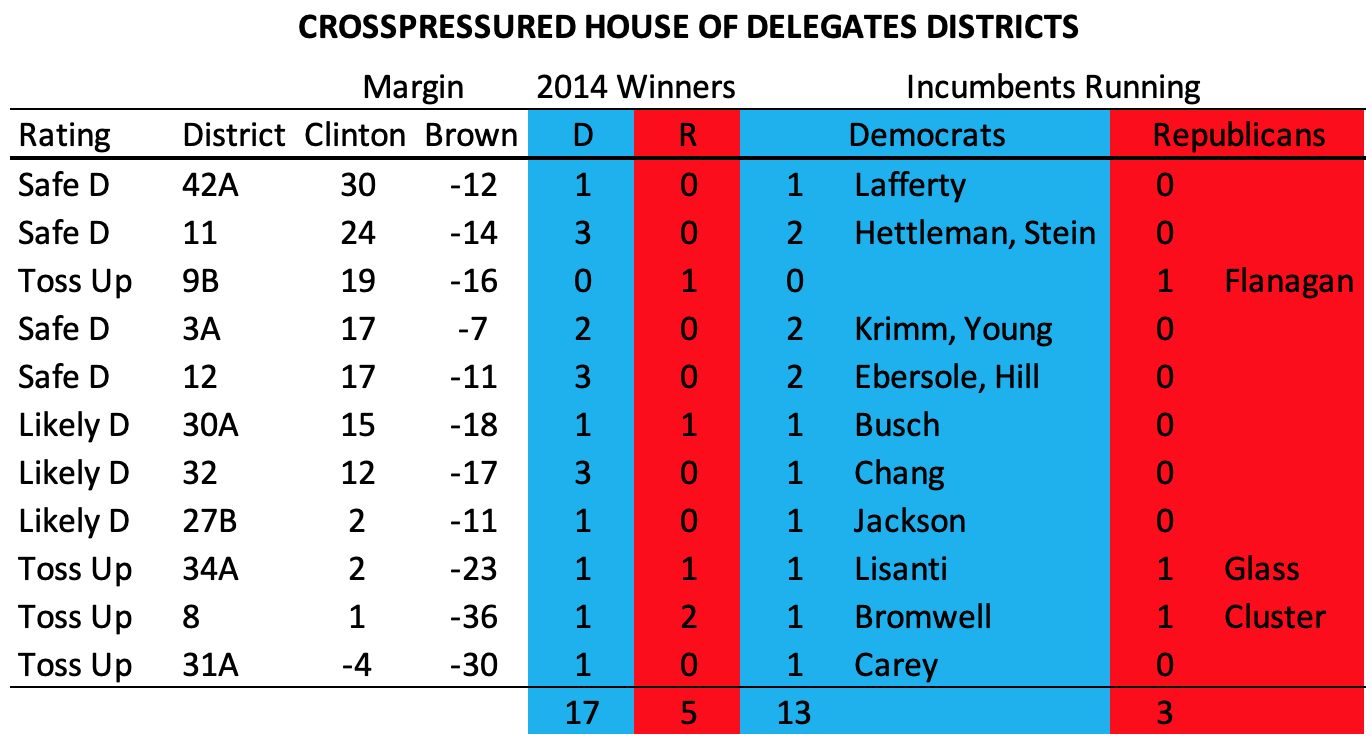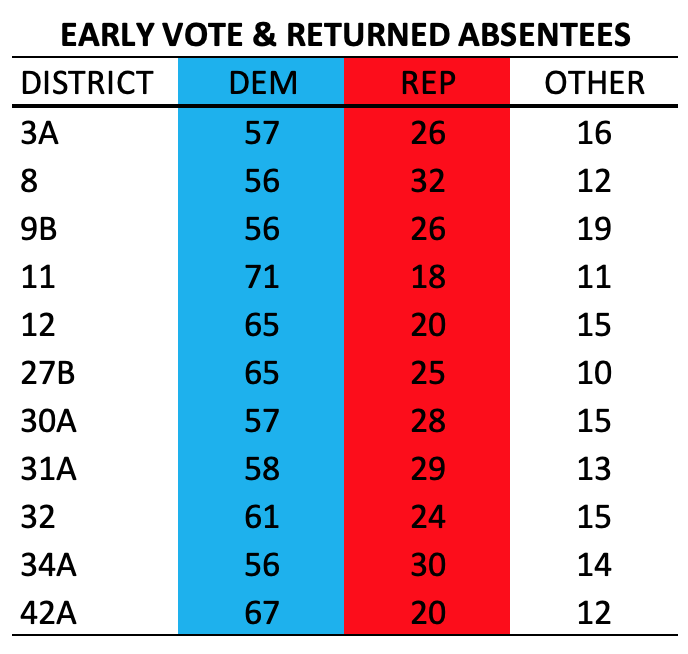 Any House of Delegates district that is crosspressured in the sense of having voted for Clinton in the 2016 presidential and for Hogan in the 2014 gubernatorial made this list. It additionally includes one district that elected a Democratic delegate in 2014 despite leaning Republican in these two contests.
Any House of Delegates district that is crosspressured in the sense of having voted for Clinton in the 2016 presidential and for Hogan in the 2014 gubernatorial made this list. It additionally includes one district that elected a Democratic delegate in 2014 despite leaning Republican in these two contests.
Nevertheless, in many ways, the House of Delegates races are less interesting than the Senate. Republicans correctly perceive their chances of obtaining a veto-sustaining minority as greater in the Senate than the House.
Vulnerable Republican
Del. Robert Flanagan in District 9B is the most vulnerable Republican incumbent in either house of the General Assembly. While Hogan won his district by 16 in 2014, Clinton won it by 19 in 2016. This Howard district is exactly the type that is trending hard towards the Democrats due to its highly educated electorate.
Even worse for Flanagan, his opponent is Courtney Watson. While Watson lost the county executive race to Allen Kittleman in 2014, she is a well-known and experienced candidate. Flanagan will need all the luck he can get to hang on to his seat.
Vulnerable Democrats
While Republican Glen Glass is likely safe in District 34A, any Democrat in Harford County always has to watch their back. Del. Mary Ann Lisanti who also represents 34A is no exception. The district, centered on Havre de Grace, went slightly for Clinton in 2016. The likelihood that Hogan will roll up an even greater margin than the 23 points he won in 2014 is no help to Lisanti. Still, she’s established and voters here clearly are used to splitting tickets.
In east Baltimore County District 8, the Republicans are likely safe and looking to take sole Democrat Del. Eric Bromwell’s seat. But Bromwells have long been a strong candidate in this district and he may be a tad better positioned than Sen. Kathy Klausmeier.
But Johnny Oleszewski’s family also had its own brand in neighboring District 6 before he lost in 2014. Bromwell came in third in 2014. While the best candidate that the Democrats could run, the question remains whether Bromwell can overcome a Hogan margin even more massive than the 36 points from 2014 in a district moving away from the Democrats.
Seeking a second term, Del. Ned Carey already represents Republican territory in District 31A in Anne Arundel. It went for Trump over Clinton by 4 points and for Hogan over Brown by 30 points. I suppose the good news for him is that the Hogan margin was smaller than in Bromwell’s district.
If he won this turf in tough 2014, Carey may be hard to dislodge in a more favorable 2018. Still, Carey won by just 52.6% in 2014, so has only a small cushion. Located just south of Baltimore City, the question is whether a less hellacious political climate can overcome an even larger margin for Hogan.
Likely Democrats (and Vulnerable Republican seat)
In District 30, Speaker Busch is looking to pick up the seat being vacated for his long-time bête noire Herb McMillan. While the Republicans always look to take out Busch, the recent Democratic sweep in Annapolis bodes far better for a Democratic pickup than a surprise defeat of Maryland’s longest serving Speaker.
I doubt Republicans will take out either Del. Michael Jackson in District 27B or pickup any of the three delegate seats in District 32, though Del. Michael Chang is the only incumbent running. Clinton won both districts by at least 12 points. Hogan’s margins will not be high enough to allow Republicans to capitalize on the gov’s success when split-ticket voting is rampant.
Safe Democrats
It seems virtually impossible that the Democrats will lose seats in Districts 3A, 11, ,12 or 42A. Hillary Clinton won all of these districts by more than 17 points. Voters in these districts are happy to split their tickets in the gubernatorial but it won’t be enough to take out the Democratic delegate candidates.
In District 3, Sen. Ron Young is endangered but District 3A excludes the most Republican turf. Dels. Carol Krimm and Karen Young should return to the House.
In District 11, the Republicans are running only one candidate. Incumbents Shelly Hettleman and Dana Stein will be rejoined by Jon Cardin, who ran unsuccessfully for attorney general in 2014.
District 12 contains much territory in Howard with many highly educated voters of the sort that are moving Democratic this year. There is little reason to think that the Republicans will close the substantial gap of several thousand votes from 2014. In any case, their top vote getter from that year is running for Senate. I expect Democratic Dels. Eric Ebersole and Terri Hill to be joined by Jessica Feldmark.
Incumbent Stephen Lafferty did not run for Senate and instead chose to seek reelection in District 42A. While Hogan will carry this district, it is hard to imagine Republicans defeating Lafferty in a district that went for Clinton by 30 points.
Early Voting Stats for These Districts





